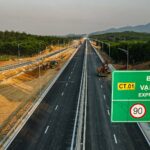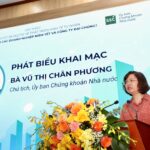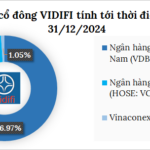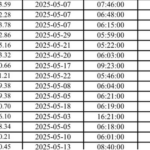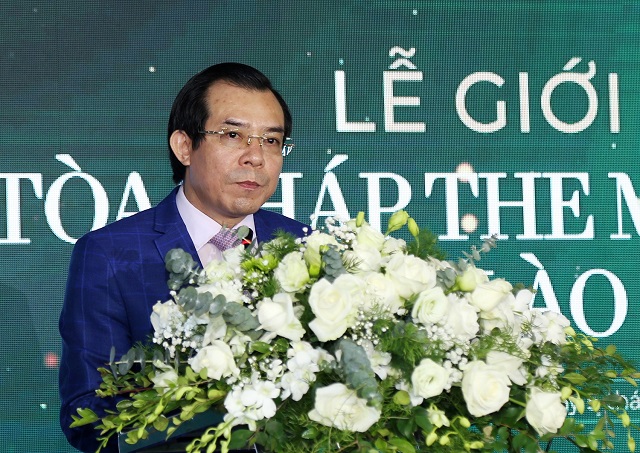Resolution 68 is seen as a liberating force, unleashing the potential and confidence of private enterprises to participate in strategic projects, contributing to a new era of development for the country.
In the field of transportation, considered the backbone of socio-economic development and national security, the private sector is increasingly playing an active role, partnering with the state in building and developing infrastructure.
CONFIDENTLY TAKING PART IN STRATEGIC NATIONAL PROJECTS
This confidence was evident at a workshop with businesses and business associations chaired by Prime Minister Pham Minh Chinh in late May 2025, aimed at effectively implementing Resolution 68. Many large enterprises affirmed their determination, commitment, and capability to engage in strategic infrastructure projects.
Typically, FPT Group Chairman Truong Gia Binh, head of the Private Economic Development Research Group, proposed a “2025-2030 battle plan” to implement a series of “major battles,” including iconic national projects such as the North-South high-speed railway, global financial center, technology, tourism, and agriculture.
From a production perspective, Hoa Phat Group Chairman Tran Dinh Long likened the high-speed railway project to a “once-in-a-millennium opportunity” and emphasized the need to protect domestic production to ensure the sustainable development of the railway industry. Hoa Phat Group’s leader proposed that the ratio of domestically produced goods in public investment projects should reach 70%, and the law should clearly and specifically regulate the priority given to the use of domestic goods.
Managing agencies need to select investors that match the characteristics of each route segment. For example, segments with defense factors should prioritize military enterprises; segments with many tunnels and large bridges should be assigned to units with deep expertise; complex assemblies should choose a comprehensive contractor with multi-disciplinary implementation capabilities. For enterprises proposing multiple segments simultaneously, overall capabilities should be carefully evaluated to determine their suitability.
In recent times, many enterprises have taken concrete actions. One of them is Phuong Thanh Company, the contractor for the Phap Van – Cau Gie project, which has proposed investing in the completion of the CT.07 highway section from Hanoi to Thai Nguyen under the Public-Private Partnership (PPP) mode.
Accordingly, Phuong Thanh proposed two options: expanding to six lanes with a length of nearly 64 km and a total investment of about VND 6,790 billion, not requiring budget capital, or expanding the Hanoi – Thai Nguyen route and simultaneously upgrading the Thai Nguyen – Cho Moi section with a total investment of about VND 16,798 billion, of which the state only needs to participate in about VND 5,363 billion.
Mr. Pham Van Khoi, Chairman of Phuong Thanh Company, said that Resolution 68 is not just encouragement but also gives private enterprises great confidence that they will be protected and supported in overcoming difficulties and obstacles when implementing PPP infrastructure projects.
Meanwhile, Deo Ca Group has just sent a document to the Prime Minister proposing to implement the expansion of the North-South expressway in the eastern phase 1 from four lanes to six lanes under the PPP mode and is ready to be the investor. The Group commits to proactively arranging capital from legal domestic sources without using the budget.
The leader of Deo Ca Group commits to implementing all the above contents with the spirit of ‘saying is doing, committing is implementing; doing and implementing must be effective, with specific, clear, tangible, and measurable products…’ as directed by the Prime Minister.
Son Hai Group has also recently proposed investing in the expansion of 263 km of the North-South expressway from Hoai Nhon (Binh Dinh) to Nha Trang (Khanh Hoa) and wishes to be assigned to implement key route sections. They commit to not using budget capital, a construction period of no more than 24 months, and a 10-year warranty. The enterprise stated that this proposal is a practical action to respond to Resolution 68 and demonstrate its efforts to mobilize social resources for infrastructure development.
In the field of aviation, Sun Group has sent a document proposing to sponsor the planning of Con Dao Airport expansion for the period 2021-2030, with a vision to 2050. The Group commits to sponsoring the entire planning cost, ensuring transparency and not affecting the community’s interests.
Notably, Sun Group has just been approved in principle to establish Sun Phu Quoc Airways, expected to operate commercially from December 2025, with a base airport in Van Don and a network of operations spanning from Noi Bai, Tan Son Nhat to Long Thanh, Danang, and Phu Quoc.
These commitments and specific actions show that private enterprises not only want to participate but also proactively lead large-scale infrastructure projects.
SPREADING THE SPIRIT OF STRONG REFORM FROM RESOLUTION 68
According to Mr. Pham Huu Son, Chairman of TEDI, this is a “ripe” time to create a real revolution in infrastructure development when the private sector is not only participating but also confidently proposing and leading large-scale national projects.
According to Dr. Nguyen Duc Kien, former head of the Prime Minister’s Economic Advisory Group, these proposals are a clear sign of the spread of the reform spirit from Resolution 68. Especially in the context of multimodal transport development, the emergence of high-speed railways is inevitable.
Dr. Nguyen Duc Kien reminded investors to carefully analyze and calculate financial plans suitable to the country’s transport infrastructure development orientation and planning when investing in PPP projects.
The expert proposed that managing agencies need to select investors that match the characteristics of each route segment. For example, segments with defense factors should prioritize military enterprises; segments with many tunnels and large bridges should be assigned to units with deep expertise; complex assemblies should choose a comprehensive contractor with multi-disciplinary implementation capabilities. For enterprises proposing multiple segments simultaneously, overall capabilities should be carefully evaluated to determine their suitability.
Some other experts also agreed that mobilizing private capital to expand the North-South expressway is necessary given the limited budget. However, the choice of public investment or PPP for each route segment should be based on financial attractiveness and market capacity. The state should still invest in segments that are not attractive enough to the private sector to ensure progress and synchronization.
According to Mr. Phan Duc Hieu, a member of the National Assembly’s Economic Committee, Resolution 68 is a “historic turning point” for Vietnam’s private sector. However, he emphasized that the challenge lies in implementation. To bring Resolution 68 to life, strong institutionalization is needed, and many legal documents that are no longer suitable need to be amended and abolished.
Fortunately, within 11 days of the issuance of Resolution 68, the Government submitted, and the National Assembly passed Resolution 198 on some special mechanisms and policies to develop the private economy – a speed of institutionalization unprecedented…
The full content of the article was published in the Vietnam Economic Magazine No. 23-2025 issued on 09/06/2025. Inviting readers to find out at here:
https://postenp.phaha.vn/tap-chi-kinh-te-viet-nam/detail/1440
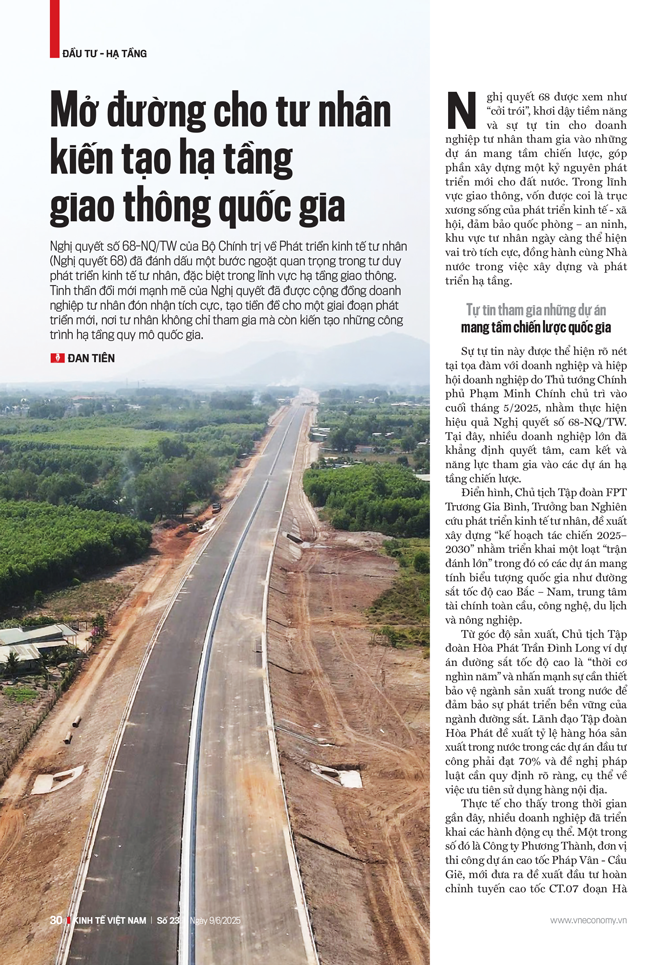
“VPBank Harnesses Opportunities from Resolution 68 with its Advanced Corporate Governance Framework.”
“With Resolution 68 offering immense opportunities for private enterprises, establishing a robust governance foundation has become imperative. In alignment with this direction, VPBank is proud to be ranked among the top 5 enterprises with the highest ACGS evaluation results in Vietnam in 2024, solidifying the bank’s pioneering position in enhancing corporate governance quality.”
The Vidifi, Deo Ca, Son Hai Trio: Racing to Expand Vietnam’s North-South Expressway
“With an unwavering commitment to excellence, Vidifi emerges as the next powerhouse player, joining the ranks of Deo Ca Group and Son Hai Group. Prepare to witness a paradigm shift as Vidifi takes center stage, poised to revolutionize the industry with its unparalleled expertise and game-changing innovations.”
The Highway Expansion Project: Unveiling the Vision for Vietnam’s Future
Vidifi, the leading infrastructure developer, has proposed an ambitious plan to the government for the expansion of 300 kilometers of the North-South Highway in the north through a public-private partnership (PPP). As the mastermind behind the Hanoi-Haiphong Highway, Vidifi faces a cumulative loss of over VND 7,800 billion by the end of 2024.





























